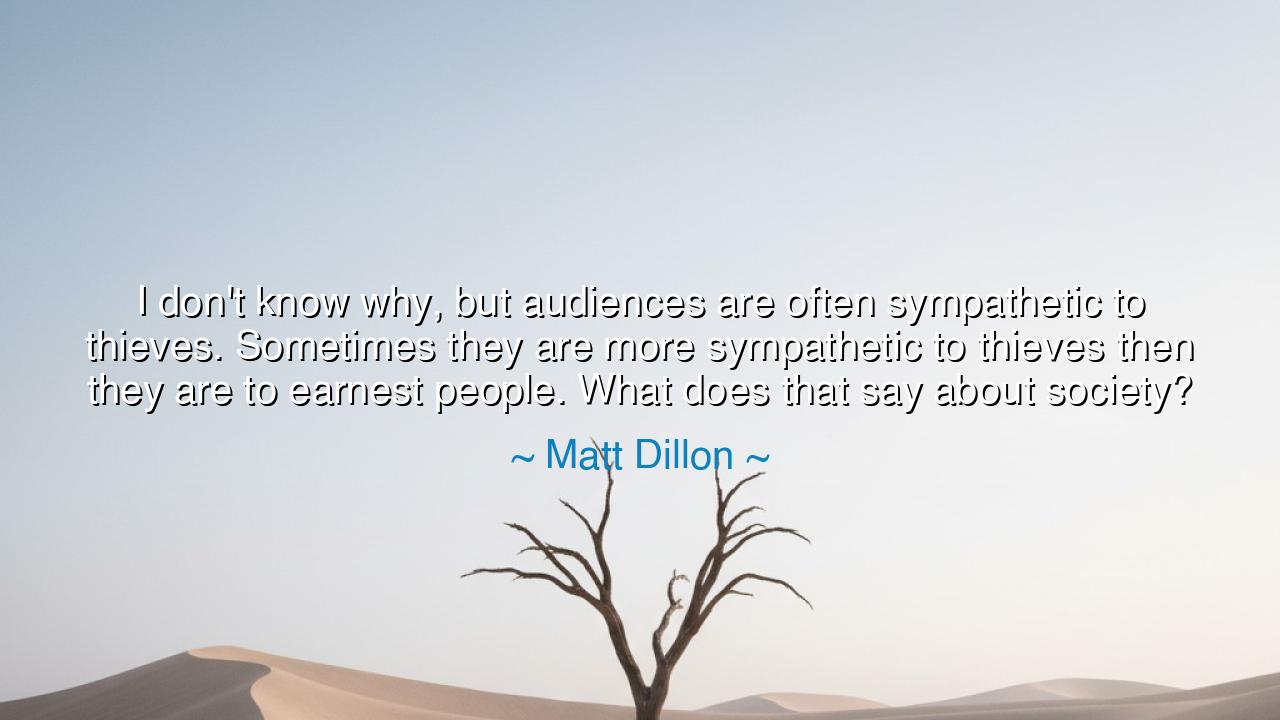
I don't know why, but audiences are often sympathetic to thieves.
I don't know why, but audiences are often sympathetic to thieves. Sometimes they are more sympathetic to thieves then they are to earnest people. What does that say about society?






Hear, O listeners, the curious reflection of Matt Dillon, who asked: “I don’t know why, but audiences are often sympathetic to thieves. Sometimes they are more sympathetic to thieves than they are to earnest people. What does that say about society?” These words strike not as idle musing but as a mirror held up to our nature. For in the figure of the thief—cunning, daring, rebellious—we see both condemnation and fascination. And when our hearts lean toward sympathy, even against our reason, we reveal hidden truths about ourselves and the world we have built.
Since the dawn of storytelling, the thief has been a figure both feared and admired. In ancient myths, tricksters such as Hermes, who stole Apollo’s cattle, or Loki, who deceived gods and men alike, were not only punished but also celebrated. Why? Because the thief stands as a challenger to authority, a questioner of rules, a figure who bends the order that constrains the rest. The audience, weary of oppression or bored by the earnestness of obedience, sees in the thief a kind of freedom, however twisted.
Consider the tale of Robin Hood, the outlaw of Sherwood Forest. Though by law he was a thief, stealing from the rich, he became a hero of legend, for his theft was seen as justice in a time when the powerful devoured the poor. The people did not weep for the robbed lords but cheered for the daring outlaw, who gave them hope that order could be turned upside down. Thus we see that our sympathy for thieves often springs not from love of crime, but from hatred of injustice.
And yet, the truth is more complex. Sometimes audiences admire the thief not for noble cause, but for cleverness alone—for the daring trick, the bold escape, the wit that outsmarts dull authority. In such cases, we must ask, as Dillon does: what does this say about society? Perhaps it reveals our secret hunger for rebellion, our resentment toward rules we quietly despise, or our delight in seeing order overturned, if only for a moment. The earnest man, who toils faithfully and abides by the law, does not spark the same thrill, though his path is more righteous.
But take heed, O seekers of wisdom: unchecked sympathy for thieves can erode the very foundations of society. When cunning is prized above honesty, when deceit is admired more than labor, the bonds of trust weaken, and a culture slips toward corruption. We must distinguish between admiring the courage of the outlaw and excusing the crime of the oppressor. For the line between noble rebellion and destructive greed is thin, and when blurred, the people suffer.
The lesson, then, is to reflect on your sympathies. Ask yourselves: do I cheer for the thief because he stands against tyranny, or because I have grown weary of honesty? Do I admire the trickster for revealing injustice, or for mocking the very fabric of trust? Let your admiration be measured, and do not forsake the quiet strength of the earnest for the flashy allure of the cunning.
In your own lives, remember that true heroism lies not in taking what is not yours, but in defending what belongs to all. Support the bold who resist injustice, but also honor the faithful who labor with honesty. Let your sympathy lean toward courage, not corruption; toward justice, not lawlessness. For only when both the daring and the earnest are rightly valued can society remain both free and good.
Thus Dillon’s words are a call to examine our hearts: why do we cheer the thief more than the faithful? What does that say about us? And what shall we do to ensure that our love for rebellion strengthens justice rather than undermines it? In answering these questions, we uncover not only the nature of thieves, but the soul of society itself.






AAdministratorAdministrator
Welcome, honored guests. Please leave a comment, we will respond soon